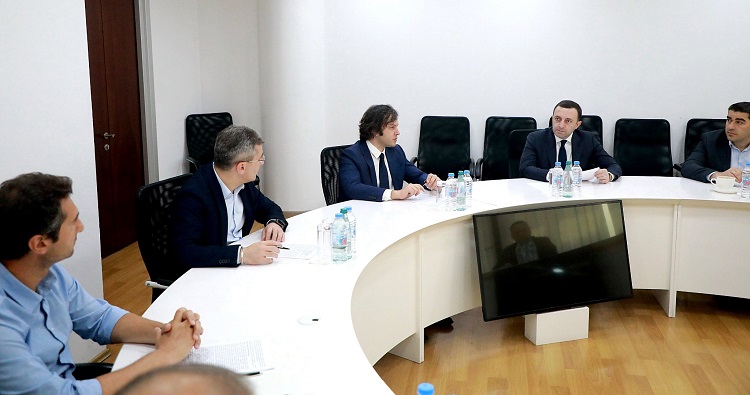Ruling party to set up group monitoring political polarisation in country

The Political Council of the ruling party met on Friday to discuss the matter of fulfilling the 12-point conditions outlined by the Council, with party Chairman Irakli Kobakhidze revealing the creation of the group to promote depolarisation in the country. Photo: Georgian Dream Press Office
The ruling Georgian Dream party will set up a group tasked with monitoring political polarisation in the country, following the inclusion of the challenge of overcoming division on the domestic political field in the conditions outlined by the European Council for granting the country the European Union membership candidate status later this year.
The Political Council of the ruling party met on Friday to discuss the matter of fulfilling the 12-point conditions outlined by the Council, with party Chairman Irakli Kobakhidze revealing the creation of the group to promote depolarisation in the country.
As explained by Kobakhidze at a press briefing, the group will include all parliamentary parties, representatives of civil society and international partners, carry out permanent monitoring on the matter and present weekly reports to the public about the current situation and trends in terms of the division.
The GD official also stressed reduction of political polarisation in the country should be considered as a basis for “effective implementation” of the remaining 11 points outlined by the European Council.
Political polarisation is one of the main challenges of our country, under which the political discussion is shifted to secondary topics instead of issues of state importance. In order to change this situation, it is important to reduce the radical confrontation between the political forces and declare a kind of moratorium on aggressive rhetoric”, Kobakhidze said.
He noted that while the ruling party was “fully aware” of its responsibility in this regard, the opposition must also “refrain” from rhetoric that implies “non-recognition of the Government's domestic and foreign legitimacy” during the six-month period outlined for meeting the set of the Council’s criteria.
The same applies to the media, which, according to the OSCE/ODIR conclusion, is one of the main sources of political polarisation in Georgia; also, non-governmental organisations, a significant part of which is directly involved in this polarising campaign”, he concluded in his comments.
On June 17, the European Commission recommended that Georgia be granted the EU candidate status once the following priorities will have been addressed:
- Work on reducing political polarisation
- Guaranteeing full functioning of all state institutions and further improving the electoral framework
- Adoption and implementation of a transparent and effective judicial reform strategy and action plan
- Strengthening the independence of the Anti-Corruption Agency
- Eliminating the excessive influence of vested interests in economic, political, and public life
- Strengthening the fight against organised crime
- Undertaking stronger efforts to guarantee a free, professional, pluralistic and independent media environment
- Strengthening the protection of human rights of vulnerable groups
- Enhancing gender equality and fight violence against women
- Ensuring the involvement of civil society in decision-making processes at all levels
- Adopting legislation so that Georgian courts proactively take into account European Court of Human Rights judgments in their deliberations
- Ensuring that an independent person is given preference in the process of nominating a new Public Defender
The European Commission will monitor Georgia's progress to address these priorities and report on them by the end of 2022.
 Tweet
Tweet  Share
Share